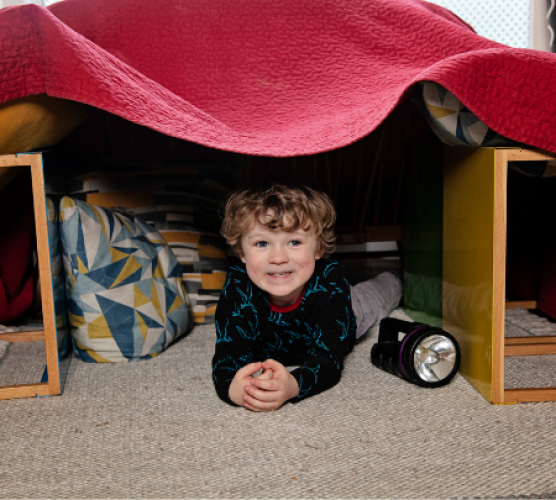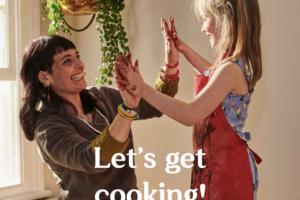Written by Rachel Carrell, Koru Kids Founder and CEO
What is the Koru Ethos?
One thing that makes a Koru Kids Home Nursery stand out is the Koru Ethos. This Ethos guides how our childminders care for children and help them to explore the world around them. Our unique approach is woven into our candidate selection process, our training, and our community. It shows in how we support our childminders when running their home nurseries, and in the core values of how we run our own business. So, if you’re thinking about becoming a Koru Kids childminder, this will be central to everything you do.
The Koru Ethos is centred around play, and the importance of intrinsic motivation and self-regulation as opposed to coercive control. This means the child is encouraged to play and explore, and ‘lead’ their own learning in the process. We particularly take the play outside—into open spaces with room for creativity and movement, in what is called guided outdoor learning.
Parents value both academic success and mental health, and they’re not willing to sacrifice one for the other. They want to give their child tools they can use their whole life to flourish on their own unique path, whatever that might be. Parents also deeply care that their child can be a positive force for good in the world. And, that they grow into an adult connected to the community, lifting up others as well as themselves. That’s what we all want, and that’s what informs the Koru Ethos.
What influenced the Koru Ethos?
When we developed the Koru Ethos, we certainly didn’t come up with it out of thin air—we had many influences. Experts from all over the world, from China to Sweden, from specialists in Montessori to Reggio Emilia, from Harvard to Oxford, were consulted in a multi-year project.
The Koru Ethos takes inspiration from the best national curriculums around the world. From Te Whariki in New Zealand where I’m from, to our own Early Years Foundation Stage in the United Kingdom. We looked at the evidence base for these philosophies and took the best bits from everything.
Let’s go through each one and highlight how we were inspired by them, because the Koru Ethos is really built on what has come before. We respect and value the wisdom that was displayed in 20th century childcare, and we want to elevate it and develop it to be fit for purpose for the 21st century. If you already work in early years, you might be familiar with some of these concepts.

Montessori: Curious minds
Montessori has been incredibly influential in the Koru Ethos. We love that children are given the freedom to work at their own pace in the Montessori approach. They also get to make their own choices, and correct their own mistakes, promoting independence. Montessori respects the unique individuality of each child. It’s about cultivating respect for others, the community, and the environment.
We love the idea of long and uninterrupted periods of learning. This approach sees children not as empty vessels to be filled with knowledge, but as curious minds to be guided through real life experiences in order to learn. We focus on observation rather than assessment. Montessori also adapts the environment for children’s levels. We embrace multi-age groupings that replicate the family. Because at Koru Kids, family is at the heart of everything we do.
Forest School: Nature as a guide
Another influence we love is Forest School. This type of learning builds confidence and self-esteem through hands-on experiences. That’s why Forest School leaders develop imagination through limited and simple resources—things like mud and sticks.
Forest School helps children understand, appreciate and care for the natural environment. In our Home Nurseries, childminders are outside with the children in almost all weathers, every day. Children who spend a lot of time outdoors grow up healthier, both in body and mind.

Reggio Emilia: Learning through engagement
Reggio Emilia is our third major influence. Like Montessori, it is Italian in origin and emerged in roughly the same part of the 20th century. Though similar, there are some important differences with Montessori. Reggio Emilia promotes curiosity and problem-solving skills. Educators learn alongside the children. Working with this approach, the educator is a guide and a resource, deeply involved.
Reggio Emilia promotes a ‘bottom up’ curriculum. That means we respond to children’s interests through conversations, which help to shape the projects adults and children engage in. This philosophy gave birth to project-based learning—following the curiosity of the child, focusing on creativity and fostering innovation. We think a lot about exploration in play. And we love the idea of children making discoveries like mini scientists.
Reggio Emilia is also grounded in the connection to the family, the community, and parental involvement and engagement. Much like Forest School, Reggio Emilia sees the environment as the ‘third teacher’.
Te Whāriki: Children’s questions
From Te Whāriki, which is the New Zealand curriculum, we added these ‘children’s questions’ to the Koru Ethos:
- Can I trust you?
- Do you know me?
- Do you help me fly?
- Can I find my path?
- Do you hear me?
- Is this place fair for us?
Children should be valued as active learners who choose, plan and challenge. Koru Kids Early Educators keep these questions front and centre in our Home Nurseries. You can read the article on our children’s questions here.

Cura personalis: The whole person
Finally, we take the concept of cura personalis, a Latin phrase which means ‘care of the whole person’. It means caring for someone, and caring for ourselves as we develop. It’s not just about ourselves—it’s about how we can contribute to our community and our society.
Pedagogues: Motivation and stories
There are a number of other influences that have shaped the way we think about childcare.
- From Steiner, we focus on helping children love learning.
- From Project Based Learning, which came out of Reggio Emilia, we consider the importance of child-led learning. This includes leaving children space to solve their own problems.
- From Alfie Kohn who wrote Unconditional Parenting—an amazing book which I recommend often—comes the importance of intrinsic motivation.
- From neuroscience and the new field of interpersonal neurobiology, we get the therapeutic value of stories. This centres on the power of telling stories to physically shape the brain as it grows.
- From Janet Lansbury—who many of you will know has a wonderful blog, celebrating the work of Magda Gerber—we take the role and power of observation and sportscasting, rather than interrupting and interfering.
- From Jerome Bruner we take progressive repetition, the idea of spiral learning. Spiral learning is when we develop ideas with increasing depth.
That’s quite the journey through different influences! Montessori, Forest School, Reggio Emilia, Te Whariki, Steiner, Project Based Learning, Alfie Kohn, neuroscience and interpersonal neurobiology, Janet Lansbury, Jerome Bruner, and cura personalis.
We know lots of different influences will create a way of working with children that helps them flourish. When children get many perspectives and think deeply about what they want to create, they make something meaningful and thoughtful. We think we have, too.

Who is the Koru Ethos for?
The Koru Ethos is for childminders, parents, and ultimately children. When we think about what children need, we take a long view, and we talk about the whole child.
We aren’t giving children a good time just for a day, a week or even a year. Children need adults who set them up for a good life. We don’t want to achieve short-term goals at the expense of the long term. We believe learning is for life, not just for school. And we want to give children the tools to succeed long after they leave our care.
What we mean when we say ‘the whole child’ is that we take the widest possible view of what success might mean for an individual child. Success in school is important. But it’s just one small part of a good life, along with other goals, like health, relationships, joy, and a sense of purpose.
If this has you excited, and you’d like to join us to help the next generation of children explore the world around them and flourish, why not apply to train as a childminder? You’ll be a part of this circle of childcare philosophies, and spend every day helping children explore the world.
Interested in becoming a childminder?



